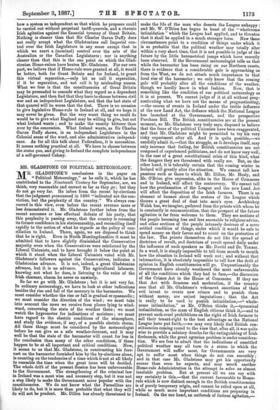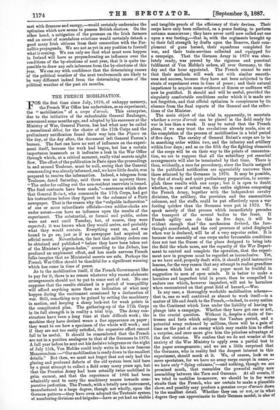MR. GLADSTONE ON POLITICAL METEOROLOGY.
MR. GLADSTONE'S conclusions in the paper on "Political Meteorology," as he calls it, which he has contributed to the Nineteenth Century for September, are, we think, very reasonable and correct so far as they go ; but they do not go very far. He infers from the recent by-elections that the judgment pronounced in 1886 "indicated not the con- viction, but the perplexity of the country." We always con- curred in this view, even before the recent reverses more or less demonstrated it. Mr. Gladstone further infers from the recent successes or less effectual defeats of his party, that this perplexity is passing away, that the country is resuming its former confidence in his statesmanship, and reconciling itself rapidly to the notion of what he regards as the policy of con- ciliation to Ireland. There, again, we are disposed to think that he is right. Even in North Huntingdonshire it must be admitted that to have slightly diminished the Conservative majority even when the Conservatives were reinforced by the Liberal Unionists, and to have brought it below the point at which it stood when the Liberal Unionists voted with Mr. Gladstone's followers against the Conservatives, indicates a Gladstonian advance. It is not, indeed, a great Gladstonian advance, but it is an advance. The agricultural labourer, knowing not what he does, is listening to the voice of the Irish charmer, charm he never so unwisely.
So far we go with Mr. Gladstone ; but it is not very far. In ordinary meteorology, we have to look at other indications besides the rise and fall of the mercury in the barometer. We must consider whether the rise or fall is gradual or spasmodic ; we must consider the direction of the wind ; we must take into account the news we receive from places lying to wind- ward, concerning the state of the weather there ; we must watch the hygrometer for indications of moisture ; we must have regard to the electric conditions of the atmosphere, and study the evidence, if any, of a possible electric storm. All these things must be considered by the meteorologist before he can give us a safe weather-forecast, and it may well be that the state of the barometer will count for less in the conclusion than many of the other conditions, if these happen to be at all important and critical conditions. Now, it seems to us that Mr. Gladstone, in constructing his fore- cast on the barometer furnished him by the by-elections alone, is counting on the tendencies of a time which is not at all likely to resemble the time when the great issue will be decided. The whole drift of the present Session has been unfavourable to the Government. The strengthening of the criminal law in Ireland was a most wise and necessary step, but it was not a step likely to make the Government more popular with the constituencies. We do not know what the Parnellitea are likely to do, but it is more than probable that what they will do will not be prudent. Mr. Dillon has already threatened to make the life of the man who deserts the League unhappy ; and Mr. W. O'Brien has begun to boast of the "wholesome intimidation" which the League had applied, and to threaten that it shall be applied in a much stronger form. Now these circumstances point to a condition of things under which it is so probable that the political weather may totally alter within a very short time, that it is not possible to judge of the future by the little barometrical jumps which have recently been observed. If the Government meteorologist tells us that while the barometer has been rising on our Northern coasts, there is evidence that a considerable gale is approaching us from the West, we do not attach much importance to that local rise of the barometer ; we only know that the coming gale will probably alter all the conditions of the weather, though we hardly know in what fashion. Now, that is something like the condition of our political meteorology as it is at present. We cannot judge of it at all without prog- nosticAting what we have not the means of prognosticating, —the course of events in Ireland under the treble influence of the new Land Act, the defiance which the National League has launched at the Government, and the prospective Purchase Bill. The British constituencies are at the present moment, as Mr. Gladstone very truly says, disposed to believe that the fears of the political Unionists have been exaggerated, and that Mr. Gladstone might be permitted to try his very risky experiment after all. And it is quite possible,—we candidly admit it,—that the struggle, as it develops itself, may only increase that feeling, for British constituencies are not composed of experienced politicians, and do not know very well, in the case of a great constitutional crisis of this kind, what the dangers they are threatened with really are. But, on the other hand, it is tolerably certain that the coming winter in Ireland will greatly alter the situation. We cannot tell how passions such as those to which Mr. Dillon, Mr. Healy, and Mr. O'Brien give expression, alike in the House of Commons and in Ireland, will affect the controversy. We cannot tell how the proclamation of the League and the new Land Act will affect the disposition of the Irish farmers. There is an element of bounce about the orators of the League which throws a great deal of dust into men's eyes. Archbishop Walsh has, we imagine, gathered from the priests with whom he is constantly in communication, that the prospect of the future agitation is far from welcome to them. They see sections of the people becoming less and less amenable to religious advice, and other sections of the people intensely desirous of a more settled condition of things, under which it would be safe to spend money on their farms and to count on the protection of the law. The priests themselves do not like the spread of doctrines of revolt, and doctrines of revolt spread daily under the influence of such speakers as Mr. Davitt and Dr. Tanner. In a word, it is simply impossible to tell from month to month how the situation in Ireland will work out ; and without that information, it is absolutely impossible to tell how the drift of opinion in English constituencies will go. Unquestionably the Government have already weathered the most unfavourable of all the conditions which they had to face,—the discussion of the Crimes Act in the House of Commons. If they use that Act with firmness and moderation, if the country sees that all Mr. Gladstone's vehement assertions of their evil intent to create new crimes and to punish them without mercy, are unjust imputations ; that the Act is really to be used to punish intimidation,—" whole- some intimidation," as Mr. O'Brien thinks it,—tyrannical intimidation, as the mass of English citizens think it,—and to prevent such cruel prohibitions on the right of Irish farmers to sell their tenant-right to the best advantage as the National League have put forth,—we may very likely find British con- stituencies coming round to the view that, after all, it was quite wise to provide a salutary douche for the extinguishing of Irish firebrands, while the great agrarian problem is under considera- tion. We are free to admit that the indications of unsettled political weather may all turn to a storm in which the Government will suffer most, for Governments are very apt to suffer most when things do not ran smoothly ; and in that case Mr. Gladstone may get his opportunity sooner than even he expects, and may wreck another Home-rule Administration in the attempt to solve an almost insoluble problem. But at present all we can say with any certainty is this,—that the current favourable to Home- rule which is now distinct enough in the British constituencies is of purely temporary origin, and cannot be relied upon at all, while so much more important conditions are preparing in Ireland. On the one hand, an outbreak of furious agitation,—
met with firmness and energy,—would certainly undermine the optimism which now seems to possess British electors. On the other hand, a mitigation of the pressure on the Irish farmers and an arrest of scandalous evictions would certainly detach a good many Irish citizens from their connection with the Par- nellite propaganda. We are not as yet in any position to foretell what is coming. We can only see that what must soon happen in Ireland will have so preponderating an influence over the conditions of the by-elections of next year, that it is quite im- possible to draw any safe inference from the by-elections of this year. We can say with confidence that the determining causes of the political weather of the next twelvemonth are likely to be very different indeed from the determining causes of the political weather of the past six months.



































 Previous page
Previous page